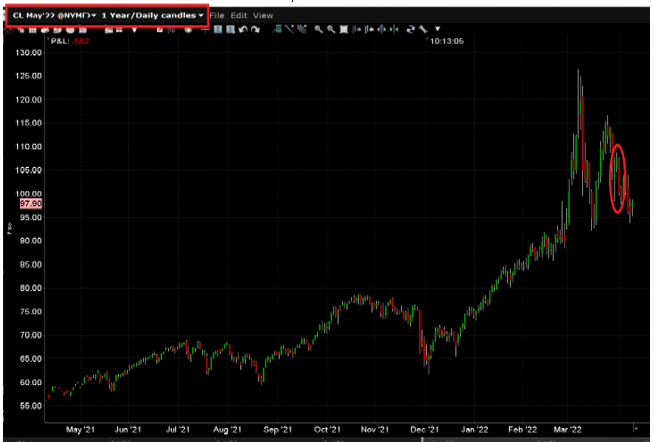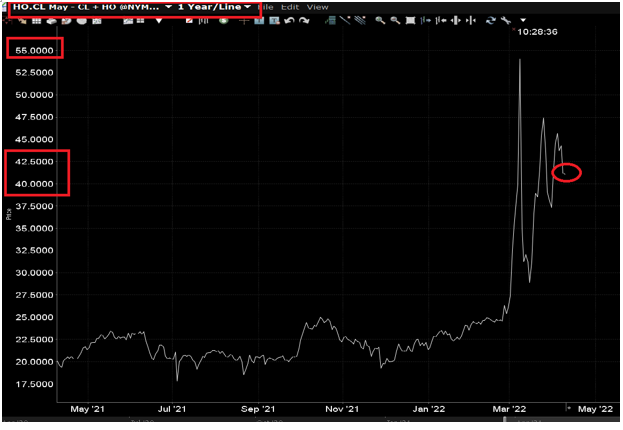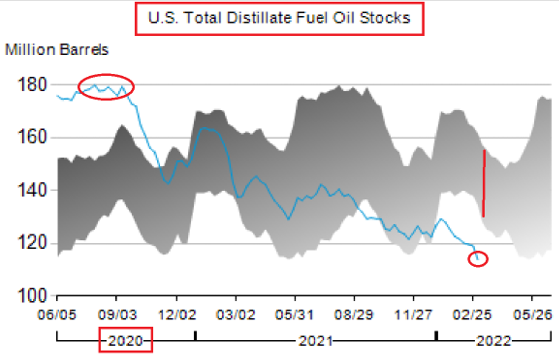U.S. crude prices fell $7 on March 31 when the U.S. government announced that it would release about 1,000,000 barrels of strategic reserve crude oil every day for six consecutive months starting in May (Figure 1).
Figure 1: WTI crude oil futures price trend of Chicago Mercantile Exchange
This follows last Wednesday's announcement by the International Energy Agency (IEA) that other member states other than the United States will release 60,000,000 barrels of additional strategic crude oil reserves.
Oil storage release has limited impact on oil prices
There is no doubt that the release of strategic reserves of crude oil in the coming summer oil season will put great pressure on the rise of oil prices. However, the amount of crude oil that can be released at present is still far from the reduced amount of Russian crude oil in the world market. In addition, due to low oil prices for many years, countries around the world have not increased their investment in refineries, but have been closing refineries everywhere. Global refining capacity, especially in Europe, has dropped significantly compared with that before Novel Coronavirus broke out. There is a serious shortage of refined oil, especially diesel oil, in the world.The cracking price difference (HO.CL) between ultra-low sulfur diesel and crude oil owned by Chicago Mercantile Institute has exceeded the historical high level of US $40 (Figure 2).
Therefore, from this point of view, the effect of releasing strategic reserve crude oil on really reducing consumers' fuel consumption burden is not very obvious.
Figure 2: The trend of cracking price difference between ultra-low sulfur diesel and crude oil in Chicago Mercantile Institute
The current shortage of diesel oil is a serious global problem. In the United States, for example, the current diesel inventory in the United States has decreased by 21% compared with the same period of last year, which is far lower than the five-year average compared with the five-year average (Figure 3).
Figure 3: Diesel stocks in the United States
How to participate in the market of crude oil and refined oil derivatives
There is no doubt that under the current circumstances, investors should continue to invest in refined oil products, especially diesel oil. However, there are few ultra-low sulfur diesel (ULSD) derivatives that can be traded and have good circulation in the world.Personally, I think the ultra-low sulfur diesel (HO) futures option of Chicago Mercantile Exchange should be a better choice.
The ultra-low sulfur diesel futures (HO) traded by Chicago Mercantile Exchange are translated as "heating oil", This Chinese name is easily misunderstood, But this is not the translator's fault. Instead, in 2013, Chicago Mercantile Institute prepared to launch ultra-low sulfur diesel (ULSD) futures. The idea at that time may be to ensure the circulation of new products. At the same time, stop trading old products with serious air pollution, That is, heating oil with sulfur content of 2000 PPM (parts per million), so an old bottle of new wine came, which was put on the market by backdoor. Ultra-low sulfur diesel oil (ULSD) with sulfur content of only 15 PPM was put into the futures contract of hot fuel oil (heating oil) being traded at that time, and the same trading code HO was extended, which led to possible misunderstanding today.
WTI crude oil (CL) and refined oil derivatives market of Chicago Mercantile Exchange is the largest crude oil derivatives market in the world. The crude oil options market of Chicago Mercantile Exchange is mainly divided into two parts, the first is crude oil standard options, and the second is crude oil ultra-short-term options, that is, Weekly options.
The common points of the above two options are: 1. They are both American options, 2. They are all spot handover and settled into WTI crude oil futures contract. The difference between standard options and weekly options is that the expiration date of standard options is the first three days before the expiration date of corresponding futures, while the expiration date of weekly options is every Friday (OG 1-5).
So what are the benefits of trading weekly options? The biggest advantage is that the time is short and the insurance premium price is relatively cheap. WTI crude oil ultra-short-term option, that is, weekly option, can effectively and flexibly manage short-term market fluctuations and risks without increasing insurance premiums.
To sum up, the current global high oil price is caused by many reasons. Simply releasing strategic reserves of crude oil on a large scale but ignoring investment in refineries may not effectively reduce inflationary pressure on consumers. Therefore, investors can pay attention to trading opportunities in crude oil and refined oil derivatives markets.
$Light Crude Oil - main 2205(CLmain)$ $E-mini Dow Jones - main 2203(YMmain)$ $Gold - main 2206(GCmain)$ $Natural Gas - main 2205(NGmain)$ $China A50 Index - main 2204(CNmain)$



Comments
谢谢。